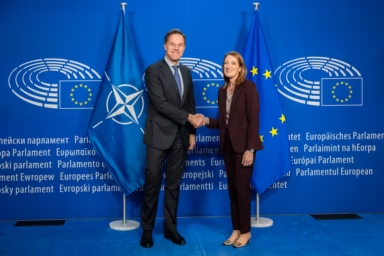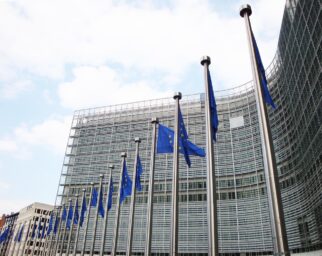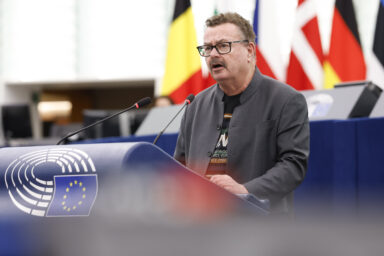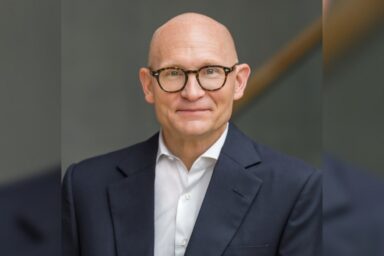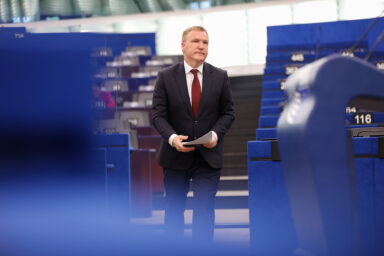Every second, two images of children being abused flash across servers in the European Union. Unless governments strike a deal on the long-stalled child-sexual-abuse-material regulation, there will be no tool available to stem the torrent, the Danish presidency warned after Monday‘s Justice Council meeting.
Peter Hummelgård, Denmark’s justice minister speaking on behalf of the Danish EU Council presidency, began the 13 October press conference following a meeting of the European Union’s justice ministers with a blunt reminder of the continent’s mood. “In times of war and uncertainty, unity is our greatest strength and supporting Ukraine’s fight for peace and freedom is a priority for the Danish presidency.” He said the Council meeting tested Europe’s readiness to confront crime, disinformation and threats to politicians.
He set data access at the top of his list. “Law enforcement authorities must have the necessary tools, including adequate access to data to effectively combat and prosecute crime.” Criminals, he warned, exploit encrypted services such as Sky ECC and EncroChat to hide offences, “communicate, and even recruit children and young people into organized crime.”
The minister then sketched three interlocking priorities. “Today, we mainly focused on data retention, lawful interception and the issue of encryption.” He promised to study the Commission’s impact assessment on data retention, due in early 2026, and awaited a technology roadmap on encryption in the second quarter of that year.
You might be interested
Data and dilemmas
Mr Hummelgård expects Brussels to confront companies that ignore warrants. “We especially look forward to the Commission’s suggestion on how to tackle non-cooperative communication providers.” The coming roadmap, he said, “will be very interesting to see how they propose to solve issues related to encrypted data.”
The focus then shifted from algorithms to abuse. “Politicians today face a wide spectrum of threats from physical violence and intimidation to online hate speech, with women candidates being more frequently targeted,” the minister noted. Online platforms, he added, increase the risks because “online exposure make politician and elected representatives more vulnerable to targeted harassment and abuse.”
Yet free expression still matters. “The question of finding the right balance in protecting freedom of speech while still ensuring an information space with reliable information safe from abuse and harm is crucial in our modern democratic society,” Mr Hummelgård said. The day’s debate, he concluded, had been “very fruitful.”
Shielding democracy
Michael McGrath, the EU commissioner responsible for justice, praised Copenhagen’s drive. The Council, he said, “tackled some of the pressing justice issues facing Europe today,” among them rule-of-law trends, accountability for Russia and access to data for cross-border probes.
Political participation stood out. “I welcome that the Danish presidency has put this topic on the agenda, focusing on how political participation is at the cornerstone of rule of law,” he said. Robust democracies need active candidates “who are free from harassment, and free from threats and acts of violence,” Mr McGrath said.
The Commission’s answer will be broad. “Democracy is not a destination. It is a daily commitment that needs nurturing, strengthening and enforcement.” A European Centre for Democratic Resilience will detect manipulation and disinformation. That hub will sit inside a larger European Democracy Shield, which Mr McGrath will soon present to his fellow commissioners.
War and justice
Russia’s assault on Ukraine dominated several questions. “To hold accountable those responsible for the Russian war of aggression, the swift establishment of the special tribunal for the crime of aggression against Ukraine remains a top priority,” Mr McGrath said. Brussels will send €10 m in rapid-response funding to the tribunal’s advance team over the next 24 months.
Justice also means restitution. The commissioner “highlighted the importance of the International Claims Commission for Ukraine” and promised continued help. He pressed member states to implement sanctions strictly: “We will continue our fight against the violation of sanctions through the complete and accurate transposition of the directive on sanctions violations.”
Detection by companies has been instrumental in rescuing children from ongoing abuse. — Michael McGrath, EU Justice Commissioner
Eurojust, the EU’s judicial co-operation agency, won applause. “Eurojust is a real success story,” Mr McGrath declared. After a fresh evaluation, the Commission plans to strengthen the body, “especially in its role in fighting organised crime and in strengthening the EU’s internal security.”
Threats at home
Reporters asked Mr Hummelgård whether elected officials should stomach harsher abuse than others. “It’s not of my opinion and it didn’t reflect the discussions during the council meeting today that politicians should have a higher tolerance for political violence,” he replied. “Politicians, as well as anybody, shouldn’t accept any level of violence, threats or anything else.”
He described a worsening climate. “The polarized and uncompromising and also hateful speech that you see online has moved out to the open and is more and more frequently also transcended into threats and even violent attacks.” Similar dangers confront teachers, nurses and refuse collectors, he said, which makes the issue broader than parliamentary corridors.
The most contentious file—the draft regulation on child-sexual-abuse material, or CSAM—never reached the Council agenda, yet dominated the press. Mr Hummelgård explained the delay. “The reason why we have put a lot of effort into it is that we’re working against a tough deadline,” he said. The voluntary scheme lapses in April 2026; after that “there will be no scanning on any platforms for materials, videos, pictures of sexual abuse of children.”
Protecting children
He rejected claims of blanket surveillance. “There’s never been any suggestion of scanning of chats or anything of the like.” The goal is “to oblige private companies, private platforms of taking a responsibility to limit the levels of enormous sharing of child sexual abuse materials.” He cited Save the Children’s estimate that every second two abusive images are shared within the EU.
Technology has changed crime. Governments must change just as quickly. — Peter Hummelgård, Denmark’s justice minister
Mr McGrath backed the urgency. Detection by companies, he stressed, “has been instrumental in rescuing children from ongoing abuse and it should continue.” Parliament already holds a negotiating stance; the Council must find one soon. “Time is now of the essence,” he said.
Narratives and next steps
A follow-up question probed the “chat control” campaign that paints the proposal as mass snooping. Mr Hummelgård bristled. “If I were a journalist, I would try to follow the money on how that narrative has arised,” he remarked. Technical safeguards and privacy concerns deserve attention, he added, but the core issue remains forcing platforms to help curb abuse.
The commissioner promised support. “We stand ready to continue to support the presidency with a view to a compromise being agreed at council level,” he said. The Commission wants no legal gap when the interim rules expire. If children’s interests guide talks, “it should be possible for the council to reach agreement on its negotiating position.”
The press conference closed with commitments rather than conclusions. Ministers will await studies on data retention, a roadmap on encryption and a full plan for the Democracy Shield. They must also craft a CSAM compromise before the clock runs down. In Mr Hummelgård’s words, technology has changed crime; governments must change just as quickly.


